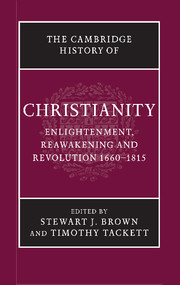Book contents
- Frontmatter
- Introduction
- PART I CHURCH, STATE, AND SOCIETY IN THE EUROPEAN WORLD, 1660–1780
- PART II CHRISTIAN LIFE IN THE EUROPEAN WORLD, 1660–1780
- PART III MOVEMENTS AND CHALLENGES
- PART IV CHRISTIAN DEVELOPMENTS IN THE NON-EUROPEAN WORLD
- 19 Christianity in Iberian America
- 20 British and French North America to 1765
- 21 Christianity in Africa
- 22 Christianity in south and south-east Asia
- 23 Christianity in East Asia
- 24 Christian encounters with other world religions
- PART V REVOLUTION AND THE CHRISTIAN WORLD
- Chronology
- Bibliography
- Index
- References
24 - Christian encounters with other world religions
from PART IV - CHRISTIAN DEVELOPMENTS IN THE NON-EUROPEAN WORLD
Published online by Cambridge University Press: 28 March 2008
- Frontmatter
- Introduction
- PART I CHURCH, STATE, AND SOCIETY IN THE EUROPEAN WORLD, 1660–1780
- PART II CHRISTIAN LIFE IN THE EUROPEAN WORLD, 1660–1780
- PART III MOVEMENTS AND CHALLENGES
- PART IV CHRISTIAN DEVELOPMENTS IN THE NON-EUROPEAN WORLD
- 19 Christianity in Iberian America
- 20 British and French North America to 1765
- 21 Christianity in Africa
- 22 Christianity in south and south-east Asia
- 23 Christianity in East Asia
- 24 Christian encounters with other world religions
- PART V REVOLUTION AND THE CHRISTIAN WORLD
- Chronology
- Bibliography
- Index
- References
Summary
The massive Christian missionary effort that had begun with the opening of the Spanish and Portuguese overseas empires was, by 1660, in full flood. This effort was undertaken by the religious orders, particularly the Dominicans and Franciscans in the early days. Because of this intimate association of missionary activity with Iberian imperial expansion and because of the ‘Reconquista’ tradition of these two empires, the Christian encounter with other religions was perceived in terms of conquest. This was soon seen by some of the missionaries involved as a problem, and a minority struggled, with only limited success, to disentangle Christianity from its role as the spiritual wing of Chris-tendom’s expansion. A dynamic new element broke into this situation with the creation of the Society of Jesus in 1542. The Jesuits became, with astonishing rapidity, the leading missionary society, with half of their 1,000 members working outside Europe by 1600.
The Jesuit effort to disengage religious outreach from Spanish or Portuguese expansion was reinforced in 1622 by the papal institution of the Sacred Congregation for the Propagation of the Faith (colloquially ‘the Propaganda’). The purpose of the new congregation was to oversee the missionary activities of the Roman Catholic Church free from the restrictions of the Padroado Real and Patronato Real, the concordats with the Holy See which gave so much control over the church outside Europe to the Portuguese and Spanish crowns, respectively. This conflict between royal and papal authority over the worldwide mission of the church was an inhibiting and ever-present factor in this period of Catholic outreach.
- Type
- Chapter
- Information
- The Cambridge History of Christianity , pp. 475 - 494Publisher: Cambridge University PressPrint publication year: 2006



